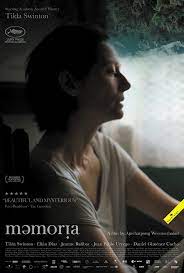MEMORIA
Columbia/Thailand, 2021, 136 minutes, Colour.
Tilda Swinton, Elkin Diaz, Jeanne Balibar, Juan Pablo Urrego, Agnes Brekke, Constanza Gutierrez.
Directed by Apichatpong Weerasethakul.
 This is a film with a strong reputation, the work of celebrated Thai director, Apichatpong Weerasethakul. In the leading actor is one popular with a wide range of popular and specialist directors, Tilda Swinton. Both are out of home territory, the action taking place in Colombia, in the city of Metal in and this surrounding mountainous countryside.
This is a film with a strong reputation, the work of celebrated Thai director, Apichatpong Weerasethakul. In the leading actor is one popular with a wide range of popular and specialist directors, Tilda Swinton. Both are out of home territory, the action taking place in Colombia, in the city of Metal in and this surrounding mountainous countryside.
Part of the reputation is the films winning the jury prize in calm 2021, but having a very limited release, in the US, travelling across the country, cinema by cinema.
The director, who writes his own screenplays, has an imaginative approach to his work, not so much interested in narrative, but rather introducing characters, staying with them, images. There is limited dialogue in this film and no musical score background, though some music introduced as part of the events. The director also uses the techniques of fixed camera, some sequences here lasting many minutes. There are two or three sequences where the camera moves, one a tracking shot of Tilda Swinton walking along a medal in city footpath pass shops. The camera work demands attention, concentration, contemplation.
We are introduced to Jessica Holland, Tilda Swinton, woken by a loud bang. We see her going to a musicologist (and something of a 10 minute tutorial on sound engineering) to recreate the sound. But, then she cannot find him. We do see her with her sister in hospital, a meal with her and her family, various visits to lecture rooms, libraries, research… And, going out into the countryside, visiting a huge tunnel excavation, and time spent with an older fish-scaler. That is some narrative for a 136 minute film, but narrative is not important. What is important is Jessica, her experiences, in reality, in her mind, her encounters, questions about life, communication. And this is key for the last half-hour of the film – which does not prepare us for a shock moment and the emergence of a green monster -like alien spaceship.
This reviewer relies on a marvellous lecture by Australia’s eminent poet, A.D.Hope, at the Australian National University English course in 1960. The lecture was on the poet, T.S.Elliott, and his understanding of what he called the “object of correlative”. The poem, according to Elliott, was not to be analysed in terms of narrative or cause and effect consequences. Rather, images were evocative, eliciting emotions and understanding, for the reader to respond, relish, retain this new awareness. And this seems to be an effective way of responding to Memoria, each image, each experience, the occasion for this poetic, object of correlative response.
To clarify: T.S. Eliot used this phrase to describe “a set of objects, a situation, a chain of events which shall be the formula of that particular emotion” that the poet feels and hopes to evoke in the reader. There must be a positive connection between the emotion the poet is trying to express and the object, image, or situation in the poem that helps to convey that emotion to the reader. (Change poet to director, poem to film sequence.)
So, not a review, but a response.